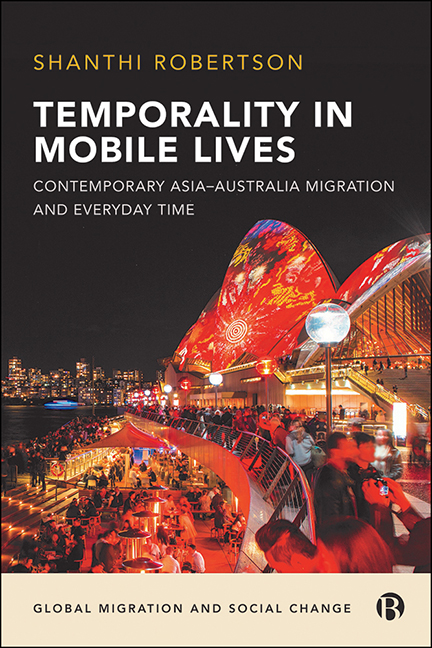Book contents
- Frontmatter
- Contents
- List of Figures
- Acknowledgements
- Series Preface
- Introduction
- 1 Chronomobilities: 21st-Century Migration and Lived Time
- 2 Asian Migrants of the Middle in Local and Global Context
- 3 Times of Work: Transified Workers and Contingent Careers
- 4 Times in Place: Moving, Dwelling, Belonging
- 5 Times of the Heart: Reconfiguring Intimacy
- Conclusion
- Notes
- References
- Index
4 - Times in Place: Moving, Dwelling, Belonging
Published online by Cambridge University Press: 04 January 2022
- Frontmatter
- Contents
- List of Figures
- Acknowledgements
- Series Preface
- Introduction
- 1 Chronomobilities: 21st-Century Migration and Lived Time
- 2 Asian Migrants of the Middle in Local and Global Context
- 3 Times of Work: Transified Workers and Contingent Careers
- 4 Times in Place: Moving, Dwelling, Belonging
- 5 Times of the Heart: Reconfiguring Intimacy
- Conclusion
- Notes
- References
- Index
Summary
Anastasia came to Brisbane in 2011 from Taipei, Taiwan, to do a master's degree in food science. Already familiar with the Australian lifestyle after visiting her aunt, who had migrated some years before and lived on the Gold Coast in Queensland, Anastasia had always thought she would stay on perhaps a bit longer after her study, but she didn't have a clear plan. Four years later, she found herself packing her belongings into her car, preparing to drive 600 kilometres of coastal highway from Brisbane to the small regional city of Rockhampton, a journey of seven hours. Living in regional Australia in a place built on the agricultural and mining industries with a population of around 80,000 had never been part of Anastasia's aspirations. But, she had gradually realized over the course of her degree that she was more interested in the interpersonal and holistic elements of nutrition than the laboratory work and so decided to continue her study with a diploma in naturopathy. Having worked part-time at a health-food store during her study, Anastasia saw a robust market in Australia for natural therapies and nutrition. But she also knew that her naturopathy aspirations limited her visa options – if she remained in food science she would be better placed on the list of ‘in-demand’ occupations for immigration purposes. But, as she told me, she wasn't willing to commit to a future career path only for the migration opportunity, so she decided to gamble a less certain migration future against her real career ambitions: “I just don't want to [go] kind of like against my dream and I just decided to still do the naturopathy and see how it goes.”
However, as her diploma year drew to a close and she studied for her final exams, Anastasia began to worry more about her visa – she just wasn't ready to go back to Taipei. She interviewed by phone for a naturopath job at a health food business in Rockhampton. Once she had been offered the job, she asked if the employer would sponsor her for a visa under the regional skilled migration scheme.
- Type
- Chapter
- Information
- Temporality in Mobile LivesContemporary Asia-Australia Migration and Everyday Time, pp. 113 - 142Publisher: Bristol University PressPrint publication year: 2021



